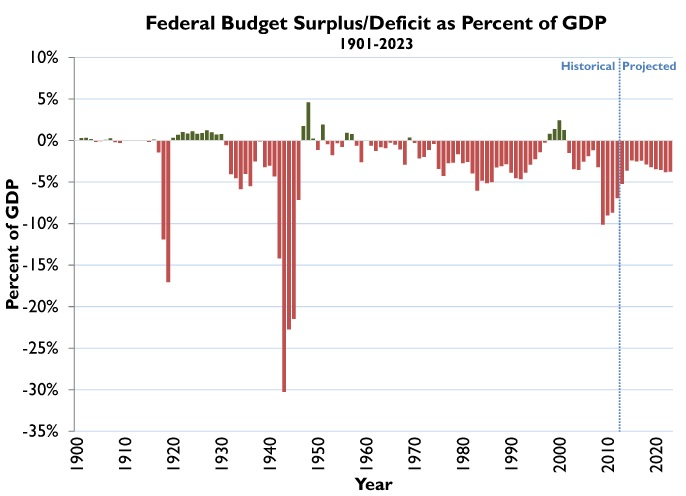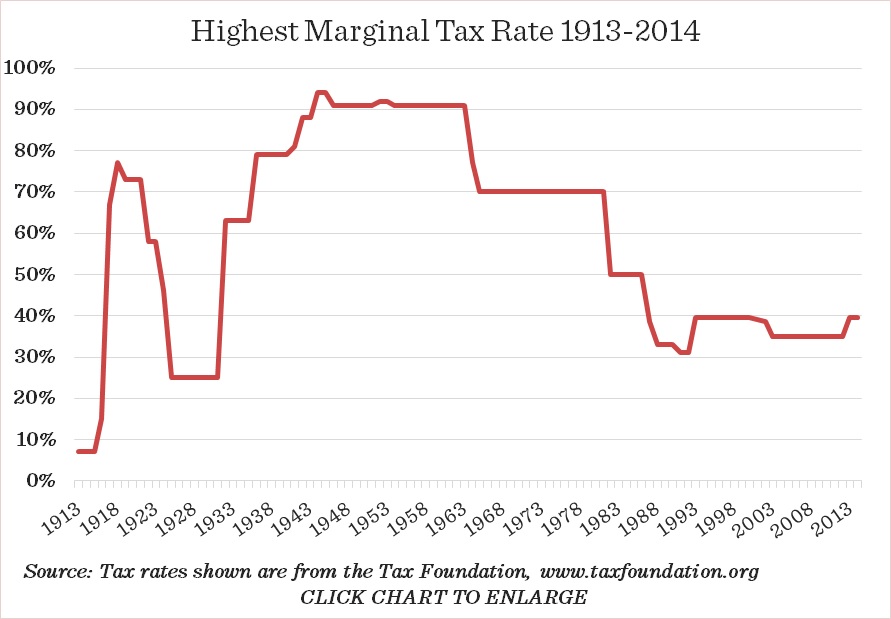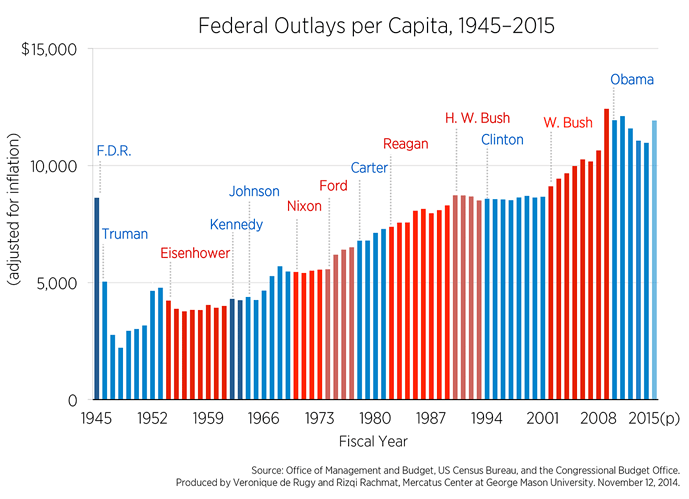If you ignore the biggest deficit in the history of the nation… sure.
Aren’t you kind of making Scott’s point? The debt was clearly not paid off.
As your first chart shows, the actual dollar value of the war debt never disappeared (that’s the red line). Debt as a percentage of GDP (the blue line) declined; but as I’m sure you’re aware, that measure is a ratio of two factors, one of which is GDP. If GDP rises substantially (which it did) then debt as a percentage of GDP falls, even if debt remains the same (which it largely did). Thus this chart is evidence for my claim - that we simply grew until the debt became insignificant - rather than yours that we actually paid it back.
Your second chart shows that we had a few years of mild budget surpluses in the 50s, but even the untrained eye can see that they don’t counterbalance the massive deficits of the war years; and, as your first chart shows, they didn’t erase those debts. So that chart doesn’t help you.
The third chart is largely irrelevant to the conversation. It show high marginal tax rates in the 50s, which I don’t dispute. What it doesn’t show is the actual effective rate of taxation, which is what matters. A quick glance at the St Louis Fed’s charts showing government revenues as a percent of GDP will reveal to you that income taxes of that era took in at most more or less the same revenues as do the tax rates of today, something in the general range of 17-19% of GDP. How that fact helps your argument I can’t imagine.
So the economy just has to grow faster than it did in the 50’s and it’s all cool.
Except… that will never ever happen. Infinite debt will fail eventually. I’m fairly sure 100%+ of GDP isn’t a “reasonable” deficit.
Me, too, but what country has a deficit which is 100% of GDP? The deficit was briefly around 10% of GDP (in 2009, after the market crashed and Republicans deliberately sabotaged the recovery effort), and was something like 3.5% last year. It will certainly be higher this year, thanks to the irresponsible tax cuts for the wealthy, but whose fault is that? Obama?
If you mean debt as a percentage of GDP, the UK (as one example) has had debt as high as 250% of GDP, and has been above 100% for decades at a time. Where’s the evidence that is untenable, for countries that borrow in their own currency?
Typo. But whatever.
Wut?
I think some folks are under the misconception that the US’s post-war status as the cornerstone of the global economy is guaranteed forever.
As long as that’s the case, it’s true that debt kind of doesn’t matter. But I don’t think that placement is nearly as guaranteed as folks would like to believe.
The stuff we’re seeing with Trump is dramatically threatening that status, pushing everyone else away from us, and forcing them to make other economic deals where we just aren’t part of the action. And as that kind of thing becomes more common, the US ability to borrow cheaply will erode.
Right now, the average interest rate we’re paying on public debt is something like 2.6%. And even so, it’s like $270B every year. It’s a huge amount of money that we’re just wasting, just like if you run a big credit card bill and don’t pay if off. If we didn’t have that huge debt, we’d be able to spend all that extra money on stuff we actually want. And that’s a ton of freaking money. And as things progress, it’s going to get to be more and more. If we see high interest rates again, like we did in late 70’s/early 80’s, it’s going to explode.
Eventually, you pay the piper, one way or the other.
I don’t necessarily disagree with that - too much debt is surely a problem - but I do want to make this point. During the downturn, interest rates were effectively below zero, meaning that you were essentially being paid to borrow. The US could have, should have, borrowed as fast as it could and spent every penny as fast as it could. It should have used the money to buy out upside down mortgages. It should have used the money to pay off all college debts. Hell, it should have used the money to make direct cash payments to people. It should have used the money to build infrastructure, though that is harder to do quickly. Economically, it was the chance of a lifetime, and we blew it, because conservatives didn’t want to give a win to the black Democrat in the White House.
That would be a way out, if it were even possible.
Agreed. The stimulus should have been MUCH larger.
And what are the returns on this spending?
Or is it more like if you borrow money to start a business, or get an education, or get a vehicle to drive to your job?
Further, state expenditure tends to come around again and be recovered in the form of taxes. Individuals are blessed with the unique ability to control their expenditure independent of their income. The state is not so lucky.
I’m not saying there is no level at which government debt is too high. But that depends critically on the state of the economy, crowding out of industry, returns on investment, multiplier effects, and the costs of borrowing (and probably other things I forget). You might well be right (I know little about the American government debt situation), but your argument is far from sufficient to demonstrate that.
Given a world of extremely low interest rates, running a deficit has made a lot of sense in the years after the financial crash. (Maybe not so much now.)
Deficit spending can be like that… If you pay it off, and don’t just have a huge deficit every year, forever.
Sure, after the crash, that was a good time to spend money, and in that environment the US was the best investment around, so interest rates could be near zero and still get loans.
The problem is that at no point does anyone seem to want tighten the belt and pay the piper.
Look at what Trump is doing. He’s destabilizing the world economy. He’s pishing away all of our trading partners. What happens when the US is no longer considered the cornerstone of the global economy? When we aren’t the gold standard for a safe investment? When the world decides that maybe the dollar isn’t the best currency to use for everything?
What happens when the US can’t borrow for zero interest, and you rely on debt just to pay off your interest? So your interest payments explode.
It’s not a good position to be in. You don’t need to panic about it, but you need to at least care about it.
What CalBuzz said in 2010 and repeated this year:
http://www.calbuzz.com/2018/06/the-gop-ignored-our-advice-and-lost-steve-schmidt/
We don’t want Republicans to become Democrats — we want Republicans to become relevant.
So that there is a vigorous contest of ideas in California politics. Right now, Republicans are so trapped in their ideological hall of mirrors that they have become a distorted caricature of themselves. They can thump their chests and win big attaboys at the California Republican Assembly convention. But they utterly fail to reflect the impulses of the vast majority of California voters who tend to be fiscally conservative and socially moderate.
Republicans believe in smaller government, lower taxes, reduced regulation, economic growth, individual freedom and law and order, to name a few GOP values.
They should continue to stand and fight for all of those. But they need to build all that into a platform that begins with a realistic growth agenda. Investments in roads, bridges, dams and/or levees, water projects, schools and universities, redevelopment projects, ports – all these things and more – are wholly consistent with their philosophical world view. Their fixation on opposing everything the Democrats propose is hurting them more than it is helping them.
Republicans could become leading advocates of an economic rebound strategy that relies on Silicon Valley innovation, green jobs, high-tech research and development. They could integrate this with increased exports for a growing agricultural sector and a healthy and expanding service economy.
**> **
> They don’t have to continually serve the interests of the wealthiest 2% of California families – they can focus of the struggling middle class. And they need to remember that California is not Kentucky or Alaska or any other state where the so-called “tea party” is a big deal. In California, tea party ideology is a non-started,In particular we suggested the California GOP (and the national Republican Party if they’d listen) should change their position on pathway to citizenship, get behind green jobs and environmental conservation, develop their political bench, re-calibrate their position on abortion and sound sensible not strident.
Again, that’s the problem. Modern Republicans don’t have a problem with spending. They just have a problem with spending on anything that helps 99% of the population.
Slash Medicaid, Medicare, education, slash government workers, you name it.
But god forbid we slow down on those fighters, submarines, bombers, and other sweet kickbacks to the massive corporations who make them. God forbid we tax carried interest at a reasonable rate - we can’t have people making millions and billions paying the same tax rate as people who make under $100k. That would just be wrong.
Eisenhower warned of the military-industrial complex, no? Modern Republicans have ignored that warning, and seem to exist only to actively fuel it. To the detriment of our actual civilian infrastructure and society.
I could sort of, possibly, somewhat respect this “cut everything to the bone” notion that some conservatives trot out. I mean, I think it is short cited to have a vulnerable power grid but be worried about some theoretical war in Korea, but that’s just me.
But they don’t want to cut everything to the bone. They seem to simply want to cut everything that does not directly benefit the wealthy. That’s what’s ridiculous. It’s not conservative - it’s patricians looking out for themselves only, and saying fuck the plebeians. And that’s not right.
…and not just have gone (mostly) to large corporations and banks, giving them more power to screw us during subsequent administrations.
Why? As long as the return is higher than interest you may as well so the same thing every year. The debt to GDP ratio would only end up worse by cutting productive spending.
Again, we never paid the piper for the WW2 debt, and that debt - 113% of GDP - basically evaporated over time. I agree that there is a point where too much debt would become a problem, but I confess I haven’t seen any good arguments for how much would be too much.
I also agree that it would be better not to run unnecessary deficits when that is possible, but here’s the problem with that: It is perfectly clear that, since Reagan at least, conservative posturing about the deficit is a sham. When conservatives are in power, they absolutely explode the deficit with tax cuts for rich people, and then use deficit panic as a crisis to try to eliminate social spending. Liberals have been stupid enough to fall for this mug’s game repeatedly, and every time they do, conservatives simply celebrate victory and then do it again.
Given that there isn’t any evidence of a debt crisis - evidence would come in the form of the US struggling to find takers for its debt issues - why should anyone on the left play this rigged game?
There isn’t an ounce of evidence that Republicans believe in small government. They believe in a large government which does the things they want rather than the things the other side wants. Only one Republican in power since Eisenhower has reduced the size of government: Bush the elder, and he was derided as no true conservative. 4 of them (Nixon, Ford, Reagan, and Bush 2) have dramatically increased the size of government they inherited.
I haven’t got the desire to rehash the argument over and over year after year, but essentially the main objection i have to immigration based GDP growth (premised on essentially servicing an ever growing debt) is that we’ll run out of space on Earth in a pretty short time in order to do this.
If the US population grows at 1% a year for a hundred years, it will reach something like over 800,000,000. If the world population grows at 1% a year overall for a hundred years, the population will reach 20.8 billion. If the current world population grew at 1% a year for 3,000 years the human population will weigh the same as the mass of the earth.
If the answer to debt driven economics is 1) the economy has to grow, or else and 2) the population has to grow, or else, we’re just kicking the can down till the Scoops come to process us down into soylent and chop down every tree and level every hill to grow enough food. I’d like to see at least some theoretical and political effort at thinking about 0 growth economics for a change.
Population growth =》economic growth, at least in the pre-automated economy, and historically, even that has shown to lead to even more economic growth (see the industrial revolution).
For more information, notice that cities with more dense population are the economic growth centers.
I can’t even call myself a casual amateur about these matters but what knowledge I have of these things tells me that by far the biggest increases in human economics aside from population growth has been energy and technology.
If you think of all human endeavor as simply energy in/energy out, increasing work efficiency makes big waves across a society. It’s why for a good 2000+ years Egypt was probably the wealthiest place on earth according to energy investment required vs energy received, since they got all the benefits of irrigation without the toilsome construction and maintenance of irrigation networks other places were forced to require.
It’s also why the industrial revolution blew up the standard of living, because the transformation of entire economies making use of heat into work created more work available than ever before in human history.
So hypothetically there is still some theoretical gain to be had, economic growth without population growth, by exploiting exotic forms of energy production not yet conceived or invented or made feasible. Imagine, for ex., if fusion power made electricity so cheap it were $0.0000001 a kW what that world would look like.
But if the answer is we have to grow or the economy collapses, this tbh i feel runs into some moral dilemmas w/re to environmental issues, and the advocates of free trade, globalization, ect. are morally sound in their own spheres of consideration but aren’t look at the larger socio-economic environmental picture of the consequences of servicing and justifying their beliefs in order to service debt driven economic decisions.



